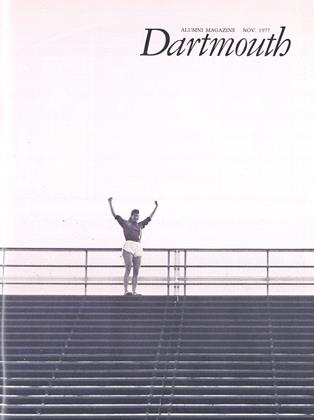Richard N. Campen '34. Sanibel and Captiva. . . Enchanting Islands. West Summit Press, 1977. 96 pp. Illustrated. $8.95. As demonstrated by his four previous books, Campen is an expert on the history of architecture, particularly that of his native Western Reserve area of Ohio. He is also an expert photographer, and this newest book shows that his talents serve him as well on two Florida Gulf islands as in Cuyahoga or Geauga County. His text is a series of diary entries from 1959 to the present; his photographs reveal his unusual skill as a nature photographer. Sanibel and Captiva shares one basic quality with Campen's previous books: his keen love of place. It's implicit in every photograph he takes.
David Loye '48. The Leadership Passion: APsychology of Ideology. Jossey-Bass, 1977. 249 pp. $12.95. A book from the psychologists's viewpoint but one with implications also for social and behavioral scientists, educators, and managers and leaders of organizations. The Leadership Passion studies the psychology of the strong ideological beliefs which go hand-in-hand, Loye believes, with strong leadership. Loye defines "the ideological personality" and formulates a theory of how such a personality shapes the drives of leaders and of the society in which they exist. Loye is research director of the Program on Psychosocial Adaptation and the Future, Department of Psychiatry, UCLA, and is the author of a previous book, TheHealing of a Nation.
John White '61 and Stanley Krippner, eds. Future Science: Life Energies and the Physicsof Paranormal Phenomena. Anchor Books, Doubleday, 1977. 598 pp. Softcover. $4.50. An exhaustive collection of 35 essays which, along with six essay-length commentaries by the editors, study all aspects of paranormal phenomena and the literature which has grown up around them. "Paranormal phenomena" means simply, in their view, "not scientifically explainable" - not yet anyway, they add. Conceding that in all probability "many socalled paranormal events are not beyond science," they nevertheless argue that "the implications of the paranormal could shake contemporary scientific models and their related technologies to their foundations" and may require "a new and revolutionary view of the cosmos, of how reality is structured, of how matter, energy, and consciousness interact." Hence the confident title: There is a "theme weaving through the history of science," they write, "in which the 'lunatic fringe' has proven to be the 'leading edge.' It is that theme which provides the substance of this book. ..."
 View Full Issue
View Full Issue
More From This Issue
-
 Feature
FeatureFie on the Flush Toilet
November | December 1977 By Harold H. Leich -
 Feature
FeatureSee How They Run
November | December 1977 By Dan Nelson -
 Feature
FeatureThe Campaign for Dartmouth
November | December 1977 -
 Article
ArticleThe DCMB Double-entendre March
November | December 1977 By Anne Bagamery -
 Article
ArticleDick's House Is Her House
November | December 1977 By S.G. -
 Article
ArticleTheir Fathers' Sons
November | December 1977
Article
-
 Article
Article1921 CARNIVAL EXPECTED TO BREAK ALL RECORDS
February 1921 -
 Article
ArticleR. R. Mars den Dies
April 1942 -
 Article
ArticleAssistant Air Force Secretary
December 1954 -
 Article
ArticleNew Trustee Nominated
December 1989 -
 Article
ArticleDartmouth's Oxford Connection
NOVEMBER 1997 -
 Article
ArticleAbout the Artist
July/Aug 2003 By Lauren Gee '03

